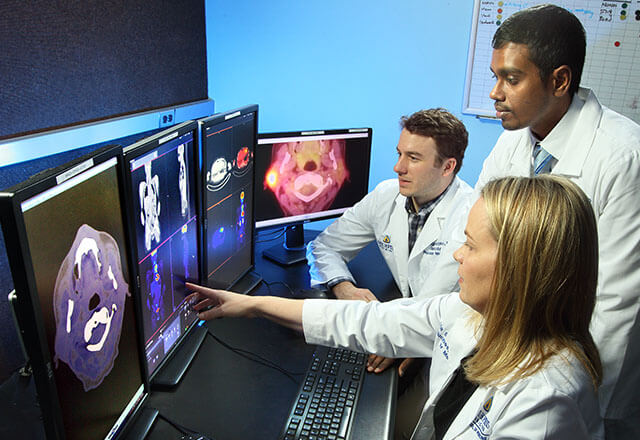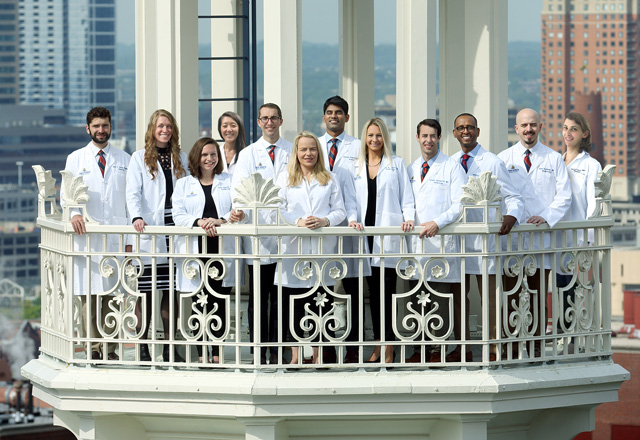Nuclear Medicine Residency Program

Now recruiting for residents to our ACGME-approved nuclear medicine residency and ACGME-equivalent nuclear medicine fellowship programs.
No. 1 nuclear medicine residency program in the country, ranked by Doximity and U.S. News and World Report.
The Johns Hopkins Nuclear Medicine Residency Training program, established in 1974, is fully accredited by the Accreditation Council for Graduate Medical Education (ACGME). Our program provides high quality specialized training in both diagnostic and therapeutic nuclear medicine by faculty experts in the field, prepares residents for success careers in clinical and academic practice and qualifies trainees to sit for the American Board of Nuclear Medicine (ABNM) certification exam. Our fellowship program is ACGME-equivalent and is available for those who have already completed a diagnostic radiology or nuclear medicine residency.
The length of training required depends on the resident's prior training. A three-year program is required for residents whose prior training includes one year of ACGME-approved residency (preliminary year). Those who have completed another non-imaging residency (e.g., internal medicine) can complete their nuclear medicine training in a two-year program. Those who have completed an ACGME-approved diagnostic radiology residency are required to take only a one-year program. International Medical Graduates with certification in diagnostic radiology outside the United States who are seeking board certification through ABR Alternate Pathway, can also apply for one or more years of Nuclear Medicine training.
For more information or any questions about the nuclear medicine residency or fellowship programs, please contact:
Residency and PET/CT Fellowship Programs
email: [email protected]
Program Director: Lilja Solnes, M.D., M.B.A.
Associate Program Director: Sara Sheikhbahaei, M.D., M.P.H.
Program Benefits
Benefits
The department pays the full cost of residents' Maryland and DC Medical licenses and the registration fees for your ABNM board exam. Residents are allotted an annual educational fund that can be used to purchase a variety of educational and learning materials. Funding is also available for residents to attend the scientific and educational meetings at which they present (e.g., SNMMI, RSNA). Johns Hopkins GME covers comprehensive medical insurance for all house staff and dependents including medical, dental and vision. Other benefits include lab coats with embroidered name and laundry service, Cooley Center Gym membership, and more.
Expert Faculty
The program has a strong clinical and basic science teaching program in all areas of diagnostic and therapeutic nuclear medicine. Our faculty includes national and world experts in various subspecialty areas of nuclear medicine and has considerable experience in teaching and research. Our faculties have authored several text-books and book chapters in nuclear medicine and molecular imaging, including the “Nuclear Medicine: The Requisites” by Harvey Ziessman, M.D., and “Nuclear Medicine and Molecular Imaging: Case Review Series”.
Johns Hopkins University is recognized as one of the most prestigious and well-known medical centers in the United States. We feel that our residency is one of the strongest nuclear medicine training programs in the nation.
Educational Opportunities
-
Didactic resident conferences feature lectures given by faculty members covering the principles of clinical nuclear medicine and diagnostic procedures, nuclear medicine physics and instrumentation, radiochemistry, radiation biology, theranostics, as well as novel developments in the field and updates to the literature. These didactic lectures are intended to both prepare the junior residents for clinical responsibilities and refresh and increase the knowledge of senior residents. Residents are freed up from clinical responsibilities during didactic lectures and clinical conferences.
Our residents also have the opportunity and are encouraged to attend the didactic radiology conferences supported by our outstanding diagnostic radiology residency program held daily at 7:30 am - 9 am.
-
Residents are actively involved in clinical conferences within the nuclear medicine division, attended by residents, fellows, faculty and researchers. There are biweekly resident run case conferences in which residents present the interesting and rare cases they have seen in the clinic. Our clinical conferences are a great opportunity to share advice and teaching points in a collegial environment and include:
- Clinical Case Follow-up Conference
- PET/CT Case Conference
- Journal Club
- Protocol Review
- Quality Assessment Conference
Residents have the opportunity to attend a multitude of multidisciplinary tumor boards held at The Johns Hopkins Hospital (e.g; lymphoma and neuroendocrine tumor boards), translational research conferences and departmental grand rounds.
-
Residents usually alternate on one-week rotations to gain experience in the various disciplines of nuclear medicine. Rotations include: Inpatient Nuclear Medicine, Outpatient Nuclear Medicine, PET/CT, Nuclear Cardiology, Therapy (radioiodine and parenteral administration) and Quality Control rotation.
A central goal of clinical training in the nuclear medicine program is to enable the resident to take full responsibility for diagnostic and therapeutic studies performed on his/her service. This involves:
- Assessing the clinical problem to be answered (chart review, personal history and even physical examination)
- Evaluating the potential role of radionuclide procedures on the diagnostic process and ensuring that the patient receives the correct study
- Assessing the technical quality of images and attempting to answer the clinical question as completely as possible before discharging the patient from the Nuclear Medicine Division
- Interpreting the study with the supervision of the faculty
For the first several months, junior residents in the clinic work in tandem with a senior resident and a faculty member under progressively diminishing direct supervision. However, attending faculty members are responsible for supervision based on the experience of the resident and are always available for consultation, questions and discussions. The experienced resident participates in the training of less-experienced residents as well as of medical students and nuclear medicine technologists, discusses results with referring clinicians and has the opportunity to present interesting/challenging cases to colleagues and faculty at clinical conferences.
A quality-control rotation provides experience in the duties of the nuclear medicine technologist, offering the opportunity to learn about radiotracer administration, image acquisition/processing, image quality control and in vitro procedures.
-
During training, residents are exposed to the type of research that is being conducted by senior faculty, other trainees, graduate students and other members of the Johns Hopkins community in various specialties. Trainees are encouraged to pursue any relevant line of research that excites their interest, and opportunities for collaboration both within and outside the department are vast.
Residents have the opportunity to present their work at national meetings, such as the Society of Nuclear Medicine and Molecular Imaging (SNMMI) and Radiological Society of North America (RSNA).
How to Apply
The Nuclear Medicine Residency Training program welcomes trainees of any race, color, gender, religion, age, national or ethnic origin or with disabilities. For acceptance into the residency, candidates should have successfully completed one year of an ACGME-accredited residency.
Applications should include:
- Completed application form
- Picture (appreciated but not required)
- CV
- Personal statement
- 3 letters of recommendation
- Medical school transcript
- USMLE transcript
- ECFMG certificate (if applicable)
For more information or questions:
Residency and PET/CT Fellowship Programs
email: [email protected]
Degree Verification
Please send requests to [email protected]
Certification Letters
Please send requests to [email protected]
Department History and Leadership

Henry Wagner Jr., M.D., likely the most well-known nuclear medicine physician in the world, was the division director for almost 30 years. Richard Wahl, M.D., a distinguished teacher, researcher and clinician, served as the division director from 2001 to 2015. Martin G. Pomper, M.D., Ph.D., an internationally renowned leader in molecular imaging, served as the division director from 2015 to 2023. The current division director is Lilja B. Solnes, M.D., M.B.A. who is also leading the radiotheranostic service.
